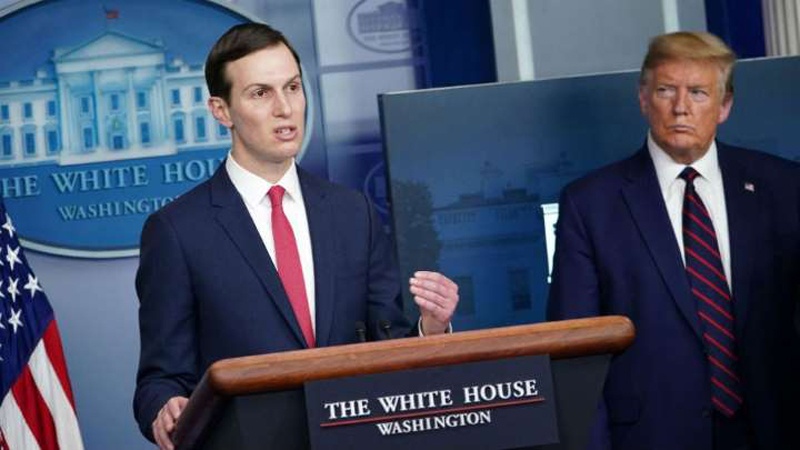
JERUSALEM/DUBAI: The US is not pressuring Kuwait and other Gulf Arab states to establish diplomatic relations with Israel, senior White House adviser Jared Kushner said Monday. After US President Donald Trump announced last week that Israel and the United Arab Emirates had agreed to normalize ties, Kushner said he expected more Arab countries to follow suit.
But Kuwait, he said, was "out there taking a very radical view on the conflict to date in favor of the Palestinians and obviously that hasn't been very constructive". Following the accord with the UAE, Kuwait said it will be the last country to normalize relations with Israel, the Al-Qabas daily reported Sunday, citing Kuwaiti government sources.
"Countries will do things that are in their interest to do. Kuwait has a very spongy history with the Palestinians," said Kushner, referring to Palestinian official support for Iraq's invasion of Kuwait during the 1991 Gulf War, when more than 400,000 Palestinians in Kuwait were forced out of the country.
Eli Avidar, a former Israeli diplomatic emissary in the Gulf turned opposition lawmaker, invoked such a scenario for Palestinians in the UAE. "Emirati citizens are different to Israelis and Americans. They won't forget," he said in an Arabic speech. "Your brothers who reside in the UAE will be expelled due to your attitudes."
More than 30 non-governmental organizations in Kuwait issued a joint statement Sunday condemning the agreement between the UAE and Israel. "We reject any kind of normalization with occupying Israel. Normalization is a dagger stuck in the Palestinian cause and in the back of Arab society," the NGOs, including the Kuwait Lawyers Association, Kuwait Media Association and Kuwait Economic Association, said in a joint statement.
The statement said the "occupying Zionist" country continues its violations against Palestinian brothers and sisters, adding the Palestinian cause is the priority of Arabs. The statement also emphasized that all kinds of rights of Palestinian people to resist the occupation are fully supported.
Kushner said it would be in Saudi Arabia's interest to normalize ties with Israel as the UAE has agreed to do. It would also weaken their common foe Iran's influence in the region and ultimately help the Palestinians, Kushner told reporters during the telephone briefing. "It would be very good for Saudi business, it would very good for Saudi's defense, and, quite frankly, I think it would also help the Palestinian people," Kushner said.
Saudi Arabia, the Arab world's biggest economy, has been silent on Trump's surprise announcement last Thursday that the UAE, a close US and Saudi ally, and Israel had decided to normalize relations. In return, Israel agreed to suspend the annexation of occupied West Bank territories, although Prime Minister Benjamin Netanyahu said the plan was not off the table in the long run.
"Israel has agreed with us that they will not move forward without our consent. We do not plan to give our consent for some time," Kushner told reporters "Right now the focus has to be on, you know, getting this new peace agreement implemented. We really want to get as much interchange between Israel and the United Arab Emirates as possible and we want Israel to focus on creating new relationships and new alliances."
Saudi King Salman and his son, Crown Prince Mohammed bin Salman, had repeatedly expressed their desire for an independent Palestinian state with economic opportunities, Kushner said. "What they basically said is that they … want to see the Palestinian people have a state and economic opportunities," said Kushner, the architect of Trump's Middle East peace plan, which was wholly rejected by the Palestinians.
Home to Islam's holiest sites, Saudi Arabia would face sensitive political calculations before a formal recognition of the Jewish state. "It is in the interest of a lot of these countries from a security point of view and from an economic point of view to have relations with Israel," Kushner said. "A lot of GCC countries want to have breakthroughs. The more that countries come together like Israel and the UAE… the harder it will be for Iran to divide and conquer."
Saudi Arabia and Israel have a common enemy in Iran, which most Gulf countries have accused of supporting militant groups in the region. "If you think about the people who don't want Saudi Arabia and Israel to make a peace agreement, the number one opponent for that is going to be Iran," said Kushner. "That shows that is probably the right thing to do." Last week, Iranian President Hassan Rouhani said the UAE's decision to normalize ties with the Jewish state was a "big mistake" and warned "against opening the path of Israel to the region".
Oman's foreign minister spoke to his Israeli counterpart on Monday, Muscat said, the first contact since Israel normalized ties with the United Arab Emirates last week. Yusuf bin Alawi subsequently spoke with a top Palestinian official, Oman added. Bin Alawi and Israel's Gabi Ashkenazi spoke via telephone about "recent developments in the region," Oman's foreign ministry said on Twitter.
Muscat had already expressed its support for the deal, and bin Alawi told Ashkenazi that Oman "clearly reaffirms its position calling for a comprehensive, just and lasting peace" in the Middle East. Bin Alawi also called for a "resumption of the peace process in order to satisfy the legitimate rights of the Palestinian people who aspire to an independent state."
Also Monday, bin Alawi spoke with senior Fatah official Jibril Rajub, who expressed his "appreciation of the role of the sultanate and its balanced and wise policy towards Arab issues and, foremost, the Palestinian question," according to Oman's foreign ministry. The Palestinian Authority has voiced its "strong rejection and condemnation" of the Israeli-Emirati deal. - Agencies










